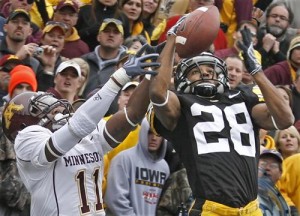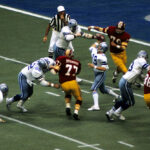Iowa Hawkeyes Ready For The Yellow Jackets Sting
Bowl season is upon us. In fact, some bowls have already taken place. Have you noticed yet?
I would assume not, because, at this point, most of the bowls played possessed little meaning for the noisy majority.
This does not detract from the devotion of those assembled in respective stadiums cheering on their home teams or those sitting raptly in front of television screens watching the action unfold in high definition on ESPN.
The bowl, regardless of stature, has meaning and consequence for the teams playing because it represents the culmination of a season of hard-fought victories—an award of merit allowing the team a chance to display its strengths during this postseason contest and hopefully to come away with a victory.
For teams playing in the higher ranking bowls scheduled later in bowl season, much more significance is attributed to the victory or the loss for individual programs and even conferences. Tangibles like TV ratings and likely exposure, recruiting and year-end rankings await the verdict—thumbs up or down.
What does it take to win a bowl game after a season of tests and close calls? On one hand it is complex because the preparation for the game is filled with disadvantages and distractions. But once a team settles its priorities, the rest comes naturally.
Then it becomes fairly simple. A team either has more talent, belief, and leadership to win or it does not.
Iowa, a member of the Big Ten Conference, is one of those teams waiting for their three hours in prime time as they take on Georgia Tech of the ACC in the Orange Bowl to be played on Jan. 5, 2010.
Weapon No. 1—Ricky Stanzi

The Hawkeyes struggled once Ricky Stanzi was injured.
A team continually disrespected during the regular season, Iowa won—and won ugly—up to 9-0, until starting quarterback Ricky Stanzi went down early in the second quarter with an ankle injury during a game with Northwestern. Iowa lost, 14-10.
It was the Hawkeyes’ first loss of the season. They would lose again the next week in overtime to Ohio State in Columbus. Stanzi did not play.
So who is Stanzi to Iowa? He is the cornerstone of the team’s belief and stands tall as the Hawkeyes’ leader.
The junior quarterback was elected by team members as Iowa’s Offensive Most Valuable Player. When Stanzi is leading the team, everyone has faith and conviction. They know they are going to win. That is one tremendous asset. Just ask Iowa’s coaching staff.
Stanzi never ponders “if” Iowa is going to win—he wonders “how” his team will do it. There is never a thought of losing. In fact, Iowa has never lost a game when Stanzi is still standing in the pocket at the end of the game. His record as an Iowa starter is 17-4.
Stanzi knows it and the team knows it. True, the junior quarterback will have been out of action for 59 days once Jan. 5 rolls around. But that does not seem to concern Stanzi—nor does the injured ankle that kept him out of action the last three games of the season.
While Stanzi led them to nine straight victories, he threw almost as many interceptions in the process as he did touchdowns. It was akin to watching a thrill junkie in action by making the odds of winning almost impossible and then coming back to snatch victory out of the jaws of defeat.
In the process, the Iowa faithful often swooned during last-second heroics pulled off by the team in the late stages of many games. The Hawkeyes, after all, have never been accused of being boring, and, with Stanzi back in the pocket, nobody who knows their MO counts them out.
Weapon No. 2—Norm Parker and Iowa Defense
Another adrenalin pumper, adding drama and action to Iowa’s hard-fought victories comes on the other side of the ball—Iowa’s defensive unit. To say that big D saved Iowa’s bacon in quite a few football contests is a huge understatement.

The Hawkeyes will look to neutralize the Georgia Tech offense.
Another key leader for the Hawkeyes, hoping to be back pacing on the sidelines during the game, is defensive coordinator Norm Parker. The 68-year-old diabetic was recovering from having a severely infected toe amputated prior to the regular football season.
Parker, who has helped build one of the best defenses in the Big Ten and perhaps in the country, has stood alongside head coach Kirk Ferentz since 1999. During that time, Parker has done a masterful job of teaching.
He not only coaches, he teaches and instills confidence and desire in young men who are able to discern the wisdom in Parker’s coaching philosophy.
When Parker suffered from another infection that would not heal early on in the season, the coach did not slow down despite doctor’s orders. The defensive guru recognized that Iowa’s brand of aggressive defense was a key to Iowa’s victories in 2009. Finally after Iowa clawed out a two-point victory defeating Michigan State, the coach had to be hospitalized.
For the rest of the season he was forced to coach from the booth—a spot he does not relish. Parker wants to be on the field with his players. Being confined at present to a wheelchair, the chances are that the coach will find himself calling plays from the press box during the Orange Bowl. Parker and his players will not like it, but he may not have any choice in the matter.
For Parker, the triple option is an old friend coming to call after a long absence. It hearkens back to the mid-’60s, when the offense dominated college football. The option wizardry remained popular on college campuses up until the ’80s. Parker credits Georgia Tech with the hybrid version of a solid offense.
The coach reportedly confessed that preparation to face Georgia Tech’s offense will be Iowa’s most difficult test of the season. But then this is a team that rises to face challenges head on—the tougher the opponent, the more determined the defense.
That goes for its coach as well as its quarterback.
Parker’s Iowa defense has played very well with the Hawkeyes, ranking 11th in the nation in total defense, 10th in scoring defense, eighth in pass defense, and fourth in pass efficiency defense.
No one will argue the fact that Parker’s defensive unit has been largely responsible for the Hawkeyes landing in a BCS bowl for only the second time in their history.
For the entire team, the prospect of playing Georgia Tech in the Orange Bowl has been delayed gratification for an extraordinary season of close calls.
Waiting is the problem. The issue with the current bowl system beyond the obvious ones—that it is antiquated and misrepresentative—is that the bowl season drags out way too long. An endless chasm of time spans waiting for the bowls to get underway.
Injured players return or those locked in the doghouse return to respectability. Timing degenerates and rust sets in. There is too much time spent listening to people analyze the games week after week. The team you ended the season with is not the same team that shows up on bowl day. That is a given.
When will we see a playoff system that could alleviate this huge gap in time and rectify the lingering belief that nothing was ever settled completely when the curtain came down on the last bowl—the BCS championship bowl in January?
[Click here to listen to Iowa Rapper Notti Boy celebrate the Iowa Hawkeyes].
















